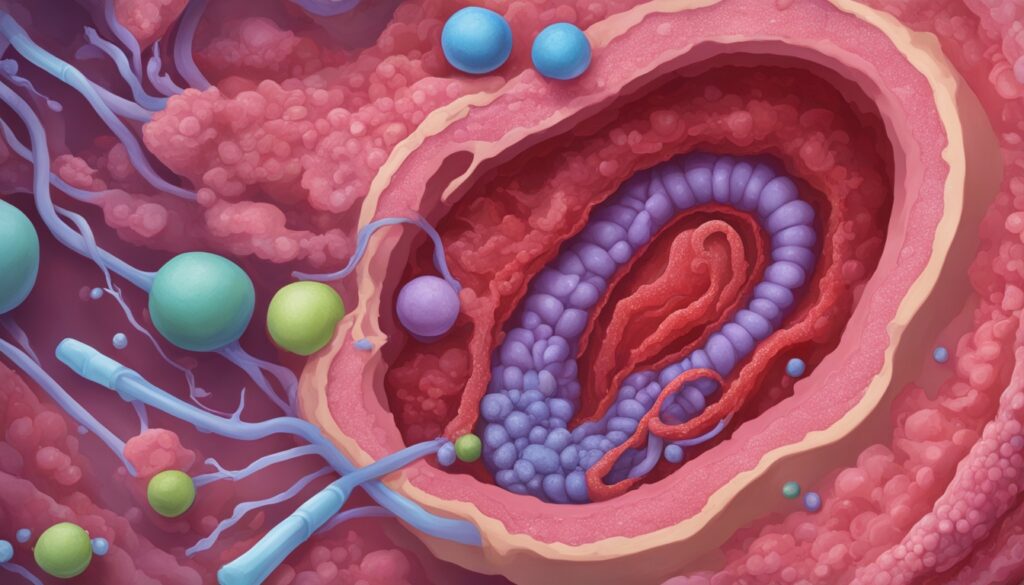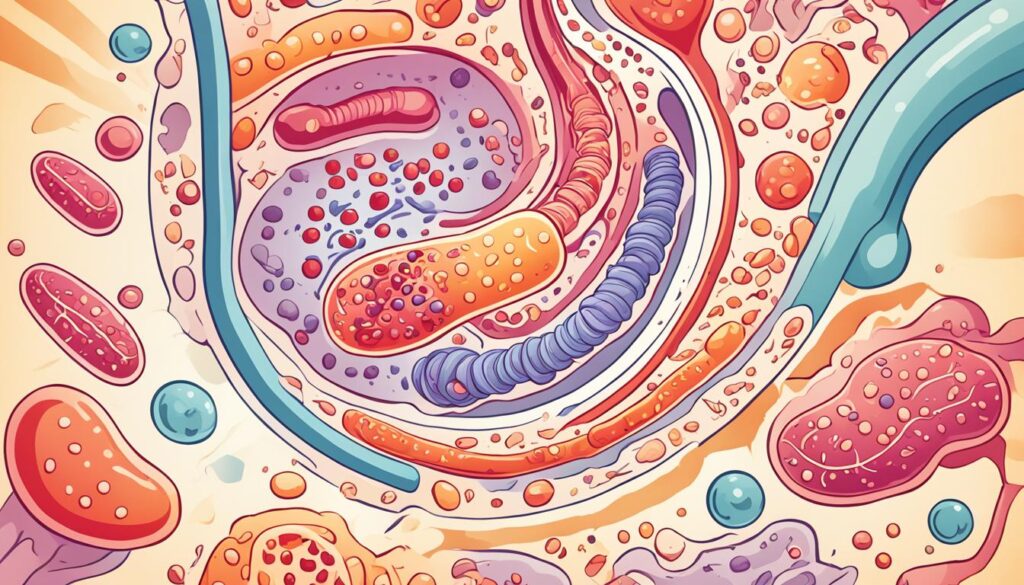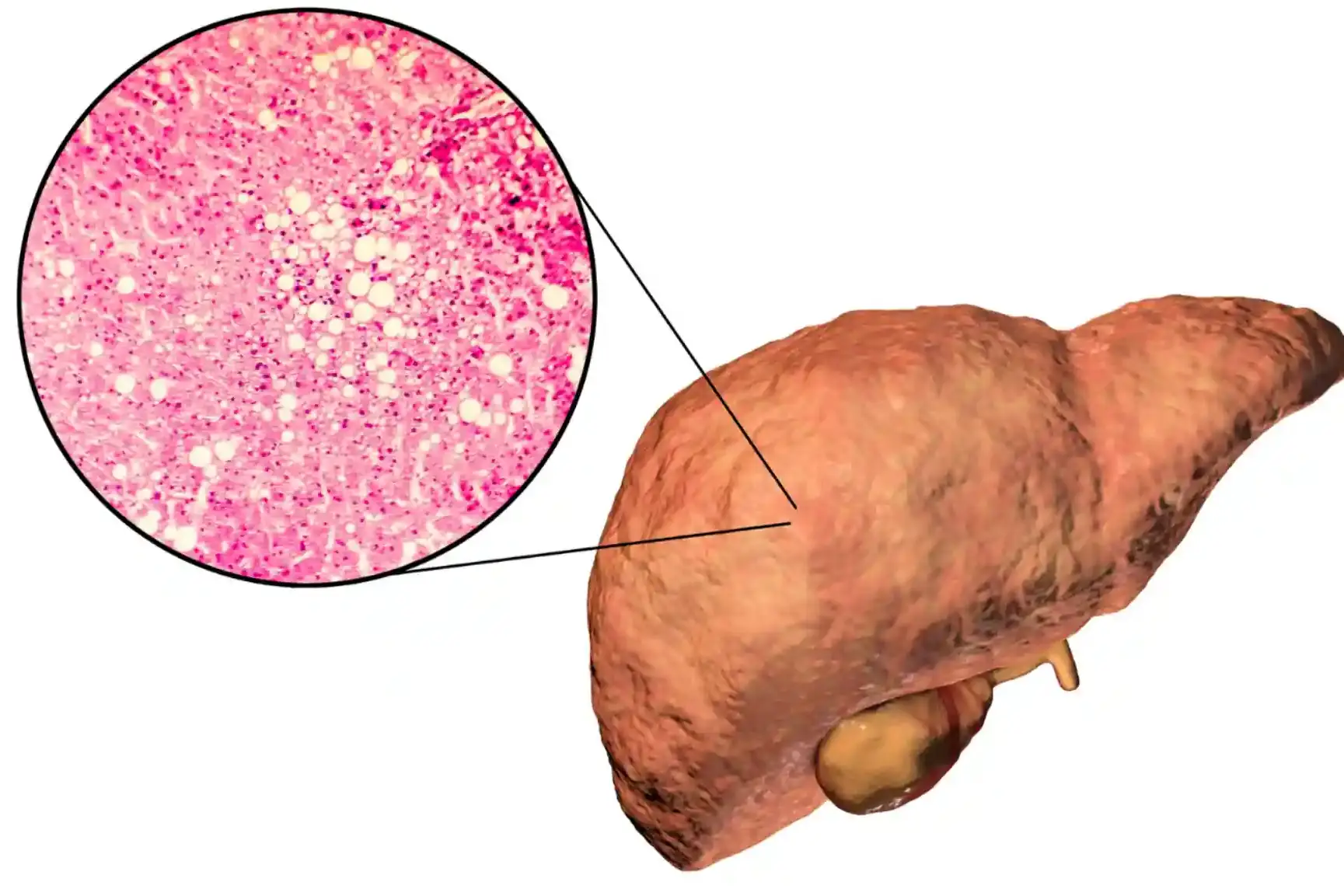Have you ever felt a burning pain in your stomach that just wouldn’t quit? You’re not alone.
Table of Contents
ToggleIn this article, you’ll learn about peptic ulcer disease treatments, why they work, and how you can get better fast. I’m Dr Nivedita Pandey, a US-trained, board-certified gastroenterologist, here to guide you with clear, easy advice. In this blog, we will cover how doctors treat ulcers, how to change your daily habits, what natural remedies help, and when you should get medical help.
I know peptic ulcers can be scary. You might worry about pain, tests, or what foods are safe. That’s why I’ve written this friendly guide to peptic ulcer disease treatments, so you feel calm, confident, and ready to heal.
What is Peptic Ulcer Disease?
Let’s look at what a peptic ulcer is and why it forms. Understanding this helps you know why certain peptic ulcer disease treatments are best.
What exactly are peptic ulcers and where do they form?
Peptic ulcers are open sores in your stomach or the first part of the small intestine (the duodenum).
After diagnosis, doctors call it peptic ulcer disease.
Locations of ulcers:
- Stomach = gastric ulcer
- Small intestine = duodenal ulcer
- Oesophagus = oesophageal ulcer
When stomach acid damages the lining, peptic ulcer disease treatments focus on healing and protecting it.
How do stomach acid and H. pylori bacteria cause ulcers?
Most ulcers come from two main causes:
H. pylori infection:
- A bacteria in your gut
- Found in over 70% of ulcers
- Weakens the lining, acid causes sores
Too much stomach acid:
- Or weak protective mucus layer
- Acid eats into tissue
Understanding these causes helps us choose the right peptic ulcer disease treatments.
What are the early warning signs of peptic ulcer disease?
You might feel mild stomach pain—or real alarm signals. Watch for:
-
Burning or gnawing pain in upper belly
-
Pain that gets better after eating
-
Nausea, bloating, burping
-
Sharp pain that wakes you at night
-
Vomit or weight loss
Stats you should know:
- ~4 million people develop peptic ulcers each year worldwide (NIH, WHO)
- Over 70% of those ulcers are from H. pylori ulcer treatment needs
These symptoms mean it’s time to explore peptic ulcer disease treatments.

Causes of Peptic Ulcer Disease
Helicobacter Pylori Infection
A bacterium named Helicobacter pylori (H. pylori) is the top cause of peptic ulcers. It infects the stomach and duodenal lining, causing inflammation and ulcer development. H. pylori accounts for most duodenal ulcers and many gastric ulcers.
Nonsteroidal Anti-Inflammatory Drugs (NSAIDs)
Regular use of nonsteroidal anti-inflammatory drugs (NSAIDs) like aspirin is a big risk for ulcers. NSAIDs can harm the stomach and duodenum’s protective lining. This damage, combined with stomach acid, leads to ulcers.
Other Risk Factors
Smoking, too much alcohol, and stress are major risk contributors. Conditions like Zollinger-Ellison syndrome can also lead to ulcers. This syndrome causes excessive stomach acid production, upping the ulcer risk.
Read: Things You Should Know About Ulcers: Detect, Consult & Cure

Symptoms of Peptic Ulcer Disease
Peptic ulcer disease often shows up as stomach pain. If someone has a gastric ulcer, their upper stomach might hurt after meals. But, with a duodenal ulcer, the pain might come on when they’re hungry, like at night or between meals.
Abdominal Pain
The main sign of peptic ulcers is a hurting stomach. The pain you feel, and where you feel it, changes with the type of ulcer. Gastric ulcers usually lead to upper stomach pain that gets worse after eating. On the other hand, duodenal ulcers cause discomfort when the stomach is empty, like at night or between meals.
Bloating and Nausea
Feeling bloated or full, and dealing with nausea, are also common with ulcers. People with these issues might not feel like eating much. They could also lose weight without trying.
Warning Signs and Complications
Peptic ulcers sometimes get serious, showing signs like sharp stomach pain, bloody or dark stools, or throwing up blood. Signs like these, which point to possible bleeding or tearing, need a doctor right away. If not treated, these conditions can be life-threatening.

Diagnosis of Peptic Ulcer Disease
It’s very important to spot peptic ulcer disease accurately. This makes sure you get the best treatment plan. Your doctor might ask for a few tests to check if you have an ulcer and what caused it.
Upper Endoscopy
For finding peptic ulcers, an upper endoscopy is the best method. It’s also called an esophagogastroduodenoscopy (EGD). In this test, a doctor looks inside your esophagus, stomach, and the start of your small intestine with a thin tube that has a camera.
Helicobacter Pylori Testing
Checking for the Helicobacter pylori (H. pylori) bacteria is key. It can cause ulcers. To find this bacteria, your doctor might do a blood test, look at your stool, or have you breathe into a special bag to test your breath.
Other Diagnostic Tests
Besides, you might need a barium swallow or X-rays. These tests can also help spot peptic ulcers. There could be blood tests and stool tests too. These can show if you have anemia or if there’s blood in your stool. They give more clues about your health.
What are the Main Medical Peptic Ulcer Disease Treatments?
Now let’s look at the top peptic ulcer disease treatments doctors use to heal ulcers.
How do proton pump inhibitors (PPIs) help heal ulcers?
Doctors often start with medicine that cuts acid.
- What PPIs are: Medications that block stomach acid
- Examples: Omeprazole, Pantoprazole
- Goal: Reduce acid so the ulcer can heal
Study result: PPIs show 80–90% healing rate in 4–8 weeks.
| PPI Medicines | Strengths | Typical Duration |
|---|---|---|
| Omeprazole 20 mg | Acid blocker | 4–8 weeks |
| Pantoprazole 40 mg | Stronger action | 4–8 weeks |
- Take once a day before food
- Fewer side effects than older meds
This is a core part of peptic ulcer disease treatments.
Can antibiotics cure ulcers caused by H. pylori?
If H. pylori is the cause, we target it directly.
- Triple therapy: PPI + clarithromycin + amoxicillin (or metronidazole)
- Time frame: 10–14 days
Benefits:
- Kills the bacteria
- Feels better in 2 weeks
- Lowers possibility of ulcer recurrence
Stats: Cures about 85–90% of infections.
This matches h. pylori ulcer treatment advice.
When are H2 blockers or antacids still recommended?
In mild cases or when PPIs aren’t an option.
-
H2 blockers: Ranitidine, Famotidine
-
Cut acid by 50–70%
-
-
Antacids: Tums, Maalox
-
Neutralize acid fast
-
Use cases:
- Quick relief
- While waiting for test results
- During pregnancy or when PPIs aren’t safe
These remain a tool in peptic ulcer disease treatments.
Are there any surgical options for severe peptic ulcer disease?
Surgery is rare now.
- Vagotomy: Cuts nerve signals to reduce acid
- Partial gastrectomy: Removes ulcer area
- Used only in: Bleeding ulcers, perforation, or when medicines fail
While rare, these help in serious cases of peptic ulcer disease treatments.
Follow-up and Monitoring
After the first treatment, patients might need more tests to check if the ulcer has healed. It’s important to stick to the treatment plan to avoid the stomach problem from coming back.
What Lifestyle Changes Can Support Peptic Ulcer Healing?
Medicine does most of the work but lifestyle matters too for peptic ulcer disease treatments.
Can diet alone heal or worsen peptic ulcers?
What you eat affects healing.
Foods that help vs those to avoid
| Eat this | Avoid this |
|---|---|
| High-fiber: whole grains, fruits | Spicy food ulcers: chili, pepper |
| Lean protein: chicken, fish | Fried/fatty foods |
| Low-fat dairy | Caffeine: coffee, tea, cola |
| Non-acidic fruits: bananas | Alcohol |
| Probiotic yogurt | Citrus or tomato juice |
How does stress impact ulcer healing?
Stress isn’t just in your head, it affects your gut.
- High stress boosts cortisol
- Cortisol reduces mucus and increases acid
- Makes ulcers take longer to heal
Sources: Mayo Clinic, Cleveland Clinic state stress slows mucosal healing significantly.
This links to stress and ulcer healing research.
Should smoking and alcohol be completely avoided?
Bad habits slow healing.
- Smoking cuts healing speed by 25%
- Alcohol irritates the stomach lining
- Both raise ulcer recurrence risk
Cutting these is essential in peptic ulcer disease treatments.

Preventing Peptic Ulcer Recurrence
It’s crucial for patients to stick to their treatment plan to prevent peptic ulcers from coming back. They should take their medicines exactly as their doctor says. It’s especially vital to finish all the antibiotics if they have H. pylori. This helps prevent new ulcers.
Adhering to Treatment Plan
Sticking to the treatment plan is key to controlling ulcers over time. Even if the symptoms get better, it’s important to keep taking the medications. Make sure to go to all the check-ups. These visits help your doctor see if the treatment is working well or if the ulcer might be coming back.
Avoiding NSAID Use
Some people get peptic ulcers because they take certain painkillers, like ibuprofen or aspirin. If that’s how you got your ulcer, you should try not to use these drugs. Find other ways to manage pain, such as acetaminophen. This can help keep your stomach and other parts of your gut safe from more harm.
Complications of Untreated Ulcers
Untreated peptic ulcers can cause serious problems. It’s vital to get medical help and follow the treatment plan. The most dangerous issue is gastrointestinal bleeding.
Gastrointestinal Bleeding
Peptic ulcers can damage the stomach or duodenum’s blood vessels, leading to internal bleeding. This can make someone throw up blood or have dark, tarry stools. Gastrointestinal bleeding is very serious and needs a doctor quickly.
Perforation and Peritonitis
Perforation is a big risk of untreated ulcers. It happens when the ulcer breaks through the stomach or duodenal wall. This can let stomach contents flow into the belly, causing peritonitis. Emergency surgery is usually needed to fix this and stop more problems.
When Should You See a Doctor for Peptic Ulcer Disease?
Knowing when to seek help saves lives.
What are emergency symptoms that need immediate care?
- Bright red vomit or dark, tarry stools
- Sudden, sharp stomach pain that spreads and doesn’t ease
- Faintness, fast heartbeat
If you spot these, seek medical help right away.
What are Some Natural Remedies that Help Peptic Ulcers?
You may also ask if natural help is safe. Here’s what we know:
Does honey, probiotics, or cabbage juice work?
Let’s see which natural items might help.
- Honey: Antibacterial. Some studies show it fights H. pylori.
- Probiotics: Lactobacillus helps heal and reduce inflammation.
- Cabbage juice: Rich in Vitamin U; some evidence of healing effects.
Research: Probiotic supplements lowered H. pylori infection by 20–30%.
This counts as a natural remedies for ulcers approach.
Are herbal supplements like licorice or mastic gum effective?
Transition: If you try herbs, be careful.
- DGL (deglycyrrhizinated licorice): Helps protect lining
- Mastic gum: May fight H. pylori
- Note: Must use DGL form; otherwise licorice raises blood pressure
These help support peptic ulcer disease treatments safely.
Special Considerations for Specific Populations
Peptic Ulcers in Children
Peptic ulcers can happen in kids, but they are not as common as in grown-ups. Doctors treat them much the same way in kids as they do in adults. They look for reasons why the ulcers formed, like an H. pylori infection or taking NSAIDs.
Ulcers in Pregnancy
Being pregnant makes women more likely to get peptic ulcers, which could be from changing hormones or certain medicines. Doctors are extra careful when treating ulcers in pregnant women. They make sure treatments are safe for both the mother and the unborn child.
Trust Dr Nivedita Pandey for Your Healing
You’ve learned about proven peptic ulcer disease treatments, from medicine to lifestyle help. Healing needs medicine, diet, stress control, and habits like quitting smoking. If you suspect an ulcer or want a recovery plan, book a consultation with Dr Nivedita Pandey MBBS, Diplomate American Board. She’s a top gastroenterologist focusing on digestive health, including ulcers, in South Delhi for personalised peptic ulcers treatment. She creates a comfortable space for women and works with every patient to provide personalized, safe care.
Don’t wait. Start your path to lasting ulcer health with expert help today.
FAQ
What is peptic ulcer disease?
A: Peptic ulcer disease is when you get sores in your stomach’s lining or the duodenum, which is the start of the small intestine.
What are the two main types of peptic ulcers?
The main types are gastric ulcers, in the stomach, and duodenal ulcers, in the duodenum.
What are the common causes of peptic ulcers?
The leading causes are bacterial infection with Helicobacter pylori and using NSAID drugs often.
What are the typical symptoms of peptic ulcers?
Symptoms include stomach pain, bloating, not feeling hungry, or losing weight without trying.
How are peptic ulcers diagnosed?
Doctors use a test called upper endoscopy to look inside your body for ulcers. They also check for the Helicobacter pylori bacteria.
What are the treatment options for peptic ulcers?
Treating peptic ulcers involves killing H. pylori with antibiotics. You also get drugs to lower stomach acid and help ulcers heal.
How can peptic ulcers be prevented from recurring?
Stick to the treatment plan, take all medicines as told, and avoid NSAIDs. Changing what you eat and how you handle stress can also make a difference.
What are the potential complications of untreated peptic ulcers?
Not treating ulcers could cause serious issues like bleeding or tearing of the stomach lining. These require fast medical help.
When should someone seek medical attention for peptic ulcer symptoms?
Go to the doctor if you have strong belly pain, constant nausea, or you see blood in your vomit or stool. These are signs you need immediate care.
Can alternative treatments help manage peptic ulcers?
Probiotics and prebiotics might help, as could some herbal remedies. But, always check with your doctor first, because not all herbal remedies are safe.
About The Author

Medically reviewed by Dr. Nivedita Pandey, MD, DM (Gastroenterology)
Senior Gastroenterologist & Hepatologist
Dr. Nivedita Pandey is a U.S.-trained gastroenterologist and hepatologist with extensive experience in diagnosing and treating liver diseases and gastrointestinal disorders. She specializes in liver enzyme abnormalities, fatty liver disease, hepatitis, cirrhosis, and digestive health.
All content is reviewed for medical accuracy and aligned with current clinical guidelines.
About Author | Instagram | Linkedin





